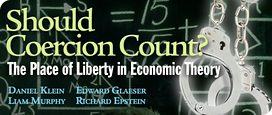I do agree with Daniel Klein that “semantics” is worth arguing about, but only in the sense that it’s good to know what people mean and it’s good to be on the lookout for conceptual sleights of hand.
There are at least three important notions of liberty (and it is liberty, I think, not coercion, that is at the heart of this discussion). The classical liberal notion is simply the negative liberty of being able to do what you want to do without interference. This is by no means the notion of liberty required by libertarians in their attempt to construct a political theory around the idea of liberty. What is needed for that is a moralized conception of liberty according to which my liberty is not infringed when I am prevented from violating your rights. This account of liberty, however, moves us directly to the controversial issue of which rights we have. Nozick saw this clearly and, as I have already indicated, I agree with him about the true location of the debate.
The third notion of liberty is one usually reviled by libertarians as the root of all evil. So it is pleasing, in this place, to see Edward Glaeser invoking it whole-heartedly. Glaeser’s discussion is built around the idea that social policy should be guided not by the utilitarian aim of promoting welfare, but by the aim of promoting positive liberty. On this notion of liberty, people are freer the more options they have available to them. The reason this is anathema to libertarians is that it implies that transfers in wealth increase the liberty of the recipient. When we add in the diminishing marginal contribution money make to positive freedom, the implications of Glaeser’s view are clearly egalitarian.
These are three fundamentally different ideas associated with the same word. So, again, it is obviously important to be clear about meaning. But where I disagree with Klein is that he appears to believe that we can establish that one of these senses of the word is the semantically correct one. My own view is that “liberty” is simply an ambiguous word. But even if this is wrong, it is obvious that nothing of significance for political theory turns on the correct meanings of words. Once we know what we mean, we can turn to the substantive issues. In this sense, the complaint, “that’s just a semantic issue” is entirely reasonable.
The obvious substantive issue in dispute between libertarians and the rest of us (including Glaeser?) is the little matter of whether there are pre-institutional property rights and whether, if there were, actual legal holdings would bear any relation to them. This is obviously not the right time to enter into this debate. But let me just respond to Klein’s suggestion that those of us who believe that property rights are entirely conventional must therefore think that the government owns everything and doles out little bits of stuff to citizens as a kind of charity. This absurdity misunderstands the rejection of pre-institutional property rights. On the view first laid out by that great conservative philosopher, David Hume, there are no natural property rights, so the government can’t have them any more than individuals can. To find out who owns what, we have to look at what the law is.

